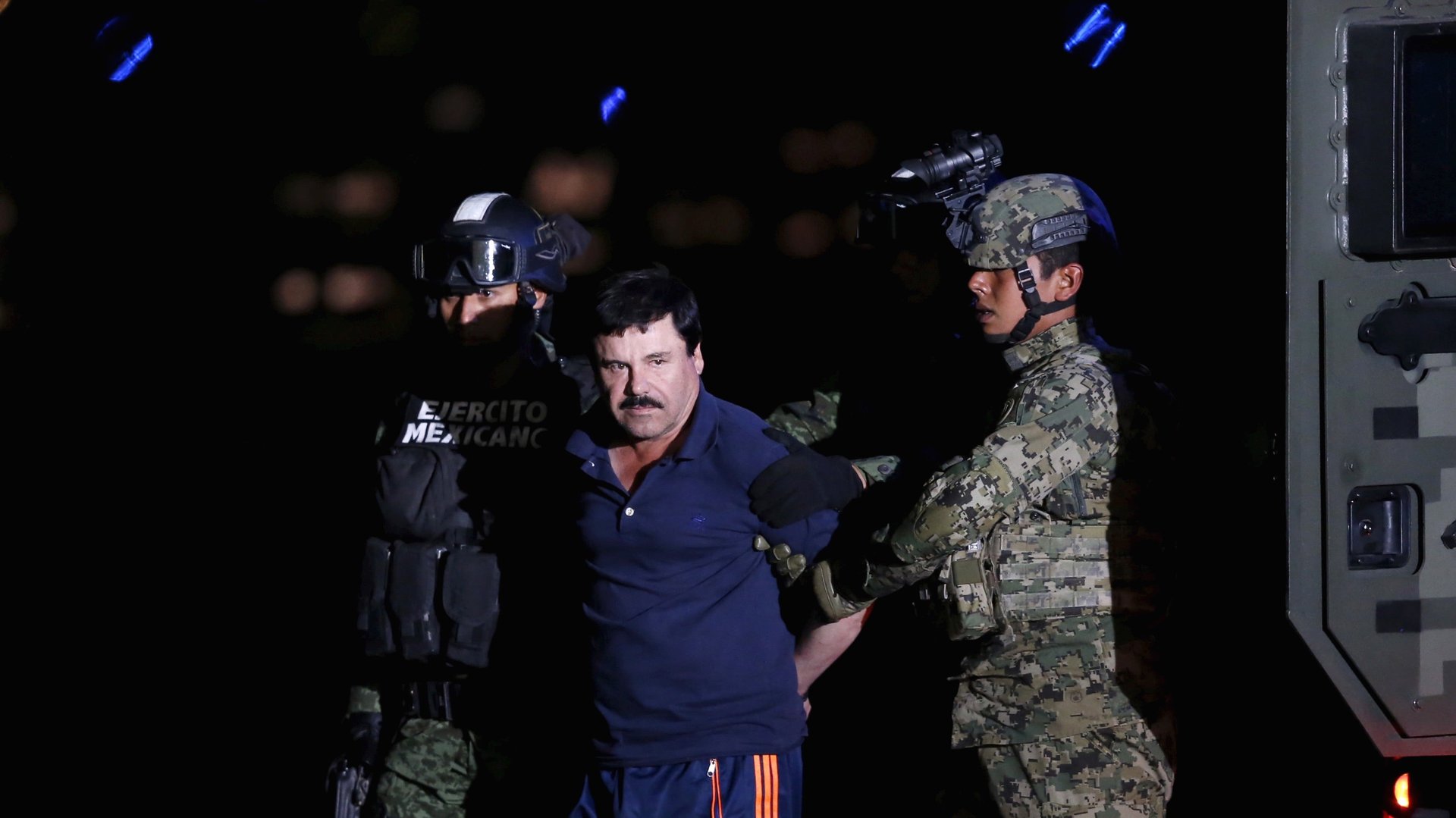Mexico’s “El Chapo” had Hollywood dreams—and they helped lead to his recapture
This post has been updated.


This post has been updated.
Mexico’s most notorious drug kingpin, Joaquín “El Chapo” Guzmán, was captured on Jan. 8 after six months of pursuit by federal authorities. Guzmán escaped from the Altiplano prison near Mexico City in July, where he had been incarcerated since 2014. July’s escape was not El Chapo’s first breakout—he fled a maximum-security prison after bribing guards in 2001.
But it was Guzmán’s exploits outside of Mexico’s prison system that earned him infamy. He spearheaded the Sinaloa cartel—also known as the Guzmán-Loera Organization, La Federación, and the Blood Alliance—which is considered one of the most powerful and vicious drug-trafficking rings in the world, responsible for as much as 25% of all illegal drugs brought into the United States. The cartel was birthed from a schism in the Guadalajara Cartel, which also produced Sinaloa’s chief rival gang, the Tijuana Cartel, founded by the Arellano Félix brothers (and now run by the notorious Enedina “La Jefa” Arellano Félix, the first woman to head a major Mexican drug ring). Battles between the two groups have turned northwestern Mexico into a veritable war zone.
If you’re thinking this sounds like the stuff of movies, you’re not alone. It appears El Chapo himself thought his story had star power—perhaps inspired by Savages, the 2012 film in which Mexican actress Salma Hayek plays a fictionalized version of La Jefa. According to The Guardian, “he wanted to take his fame further, to the silver screen in the form of a biopic,” and it was this that ultimately led to his recapture.
Mexican attorney general Arely Gómez says El Chapo was so determined to see his biopic made that he attempted to contact producers and actors through intermediaries after escaping in July. By tracking the movements and communiqués of El Chapo’s lawyers, and their meetings with potential participants in the would-be movie, Mexican authorities were able to trace the kingpin to his old stomping grounds in the Sierra Madre Mountains.
Interestingly enough, had El Chapo waited a few short weeks, he would have gotten his biopic without risking exposure. A film titled El Escape del Siglo, which centers on El Chapo’s life and most recent exodus, will arrive in theaters on Jan. 15.
Meanwhile, American director Ridley Scott has teamed up with Fox to adapt Don Winslow’s novel, The Cartel, which is partly inspired by the exploits of El Chapo. Deadline reports that Leonardo DiCaprio is being considered for the lead role.
The circumstances of El Chapo’s recapture offer plenty of dramatic inspiration. According to CNN, authorities aided by the Mexican navy raided a property in the coastal city of Los Mochis, Mexico, where El Chapo was staying, early on Jan. 8. The navy encountered heavy gunfire from inside the house when they arrived, according to reports. Five suspects were killed, and six others were arrested. In the confusion of the shootout, El Chapo reportedly escaped through a manhole leading to the area’s sewer system. Soldiers pursued him through the tunnels before he managed to surface and steal a car. Authorities apprehended him shortly thereafter on a highway outside of the city.
If El Chapo plans to attempt another escape from Altiplano—he was reportedly returned the prison he escaped from six months ago—then he’ll need to move quickly. Mexican attorney general Arely Gomez has confirmed that the country will begin proceedings to extradite El Chapo to the US, where he is wanted on a variety of drug-trafficking charges.
(Updated at 6:48pm ET with confirmation of Mexico’s intent to extradite El Chapo to the US.)